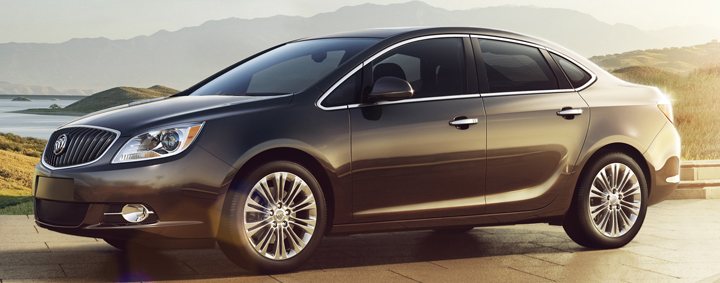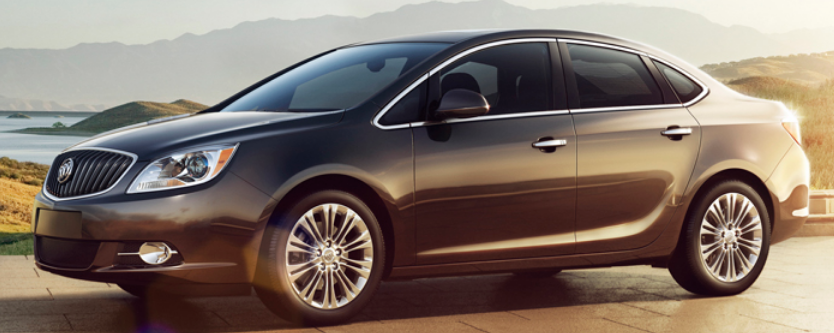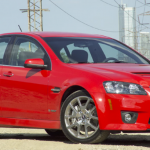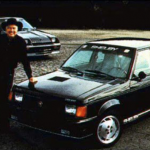
Note: This report supplements Consumer Guide Automotive’s full report on the 2012 Buick Verano, an all-new compact car that starts at $22,585.
First Spin: 2016 Buick Cascada
Test car came equipped with essentially no options; the Convenience model is actually the base model equipped with the “1SG package.” Total MSRP with $885 destination = $24,670.
Powertrain: 177-horsepower 2.4-liter 4-cylinder, 6-speed automatic transmission.
Acceleration: Car and Driver quotes a 0-60 time of 8.2 sec; Motor Trend, 8.3. This test car felt about that “fast.” As tested, Verano performance is adequate, but no more. I think this car would feel taxed with a full passenger/cargo load or with two aboard going up a long ascent at altitude. Tester suffered somewhat mushy throttle action, and the tranny didn’t want to kick down readily in low-speed corners—both of which conspire to make the car slightly frustrating in change-of-pace traffic. Otherwise, the powertrain is smooth and well behaved.
Fuel Economy: Averaged 27.5 mpg over 191 miles of Phoenix-area driving split roughly 50/50 city/freeway. That compares well with Chicago’s 26.6 mpg and EPA’s 21/32 city/highway mpg.
Ride Quality: My colleagues rate a Verano a “6” in this category. I’d be inclined to give a “7” here, especially in view of the 18-inch rolling stock fitted (see next section). The ride can be a little lopey over long-wave undulations, and damping always feels on the soft side, but there’s no queasy pitch or any hint of bottoming on deep ruts. Also, tester coped exceptionally well with one very patchy pavement section I routinely travel. One reason the ride seems as comfortable as it does is a very solid, quiet structure. The car feels like it’s very well insulated, as indeed it is, according to C/D (filled body cavities, double-side dash insulation, laminated windshield and side glass, sound-blocking underbody panels).
Steering/handling/braking: Agree with my colleagues that Verano suffers moderate body lean in fast corners but has good braking ability. Would add that crosswind resistance could be better, partly due to the lifeless steering, which requires more correction than usual, and partly I suspect because of some unwanted tramlining. Note that tester came on 235/45R18-94H all-season Continental ContiProContact tires.
Quietness: As my colleagues say, a strong point. GM’s Ecotec 2.4 isn’t the nicest-sounding 4-cylinder around, but it avoids sounding cheap and is vocal only at high rpm, where most owners are unlikely to venture very often.
Five 2013 Premium-Vehicle Bargains
Controls: The staff report echoes my views. GM really needs to rethink Verano’s central control panel, which I believe is shared with—and similarly afflicts—the Regal. The trip-computer controls on the left stalk aren’t the best either, but I’ve grown accustomed to them. The gauge-cluster display graphics look 30 years old and could be more legible. The audio’s steering-wheel “Srce” button moves up and down to change stations or CD tracks, but has to be flipped just so to avoid accidentally changing to another source; it’s too fiddly for me. Dash-vent shape and positioning need redoing as well.
Details: This middle-trim model didn’t strike me as particularly premium, but fit/finish and materials are more than passable for a compact of this price. That said, the fake-wood trim doesn’t convince, and more soft-touch surfaces wouldn’t go amiss, but the cabin gets a nice lift from the various slivers of chrome.
Room/comfort (front): The seats felt a bit overstuffed, and I was never able to find a completely relaxed driving position. Backrest-recline levers are elbow-wrenchingly hard to reach and also feel plasticky-cheap. If the accountants are looking to save money, it would be more convenient to have a power backrest recline and manual fore/aft. Had no issues with forward visibility, but the bulky rear headrests limit the view directly aft.
Room/comfort (rear): I agree that room is good but not great for the class, that the “double bucket” seat cushion can feel confining, and that entry/exit is relatively tight. Would add that there’s decent underseat footroom, but getting the feet in and out of there can be tricky, especially if the seat is set well aft. Many compacts include rear air vents, but not this one, curiously enough.
Cargo room: The trunk is roomy enough and usefully shaped, but I was disappointed by its cut-rating finish, with no liner or other protective surface. The door map pockets are so small and oddly shaped as to be almost useless.
CP Says: Buick has done a remarkable job with the Cruze-shared Delta II platform. The Verano is a big cut above the Chevy and compares well with most other compact cars, although it’s not for buyers who want an involving drive. Yes, it follows the longtime VW formula of being content-rich at the risk of sticker shock, but I think the Verano can pull it off. As the staff report says, Verano “offers levels of luxury and quietness that would be at home in larger premium-midsize cars . . . and it deserves your consideration.” Still, it needs more power and better mpg—the former might actually help the latter—plus better egonomics and the correcting of a few detail gaffes like the missing rear air vents. Am surprised that Verano bows without the Regal’s “mild hybrid” eAssist option, but perhaps they’re saving that for next year.



